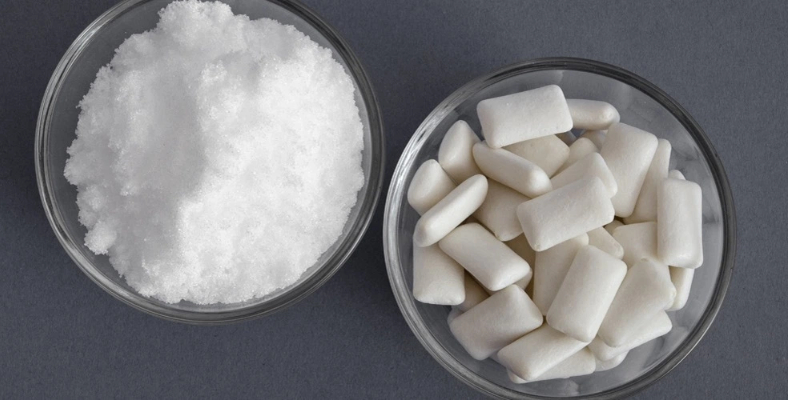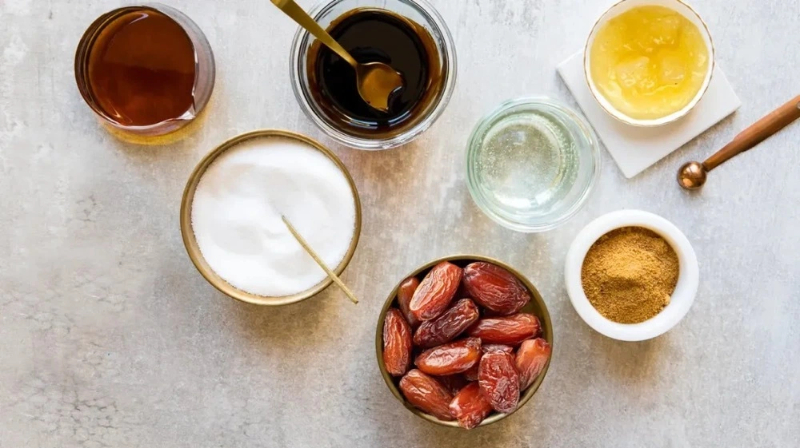Views: 222 Author: Sara Publish Time: 2025-09-16 Origin: Site








Content Menu
● Understanding Sweeteners and Diabetes
● Artificial Sweeteners Suitable for Diabetics
● Natural Sweeteners for Diabetics
● Sugar Alcohols and Their Role
● Emerging and Functional Sweeteners
● Choosing the Right Sweetener
● Health Considerations and Current Research
● Practical Tips for Incorporating Sweeteners
>> 1. Are artificial sweeteners safe for people with diabetes?
>> 2. What natural sweeteners can diabetics use?
>> 3. Can sugar alcohols be consumed freely by diabetics?
>> 4. Do all sweeteners have zero calories?
>> 5. Are sweetener blends better for diabetic use?
Managing diabetes effectively involves careful dietary choices, particularly regarding the consumption of sweeteners. Sweeteners play a crucial role in providing the sweetness people enjoy while helping control blood sugar levels. This comprehensive article explores the types of sweeteners that are beneficial for diabetics, their advantages and drawbacks, and offers practical advice for incorporating them into a diabetic-friendly lifestyle.

Sweeteners are substances used to sweeten foods and beverages. For people with diabetes, the goal is to find sweeteners that add sweetness without causing significant spikes in blood glucose. Traditional sugar, or sucrose, quickly elevates blood sugar, so alternative sweeteners—both natural and synthetic—are often preferred.
Sweeteners suitable for diabetics are generally categorized as:
- Artificial sweeteners (synthetic, low or zero calorie)
- Natural sweeteners (plant-derived, low-calorie or calorie-free)
- Sugar alcohols or polyols (with reduced caloric content)
- Emerging and functional sweeteners (novel extracts or fermentation products)
These alternatives aim to satisfy sweet cravings with minimal impact on blood sugar levels, facilitating better diabetes management.
Artificial sweeteners are synthetic compounds that provide intense sweetness without the calories and blood glucose impact of sugar. Because they are not metabolized like glucose, they typically do not raise blood sugar.
Common artificial sweeteners include:
- Aspartame: About 200 times sweeter than sugar, suitable for cold foods and beverages but not stable under heat.
- Sucralose (Splenda): Altered sugar molecules that pass through the body without absorption.
- Saccharin: One of the earliest artificial sweeteners, calorie-free but sometimes with a bitter aftertaste.
- Acesulfame potassium (Ace-K): Often combined with other sweeteners for taste enhancement.
- Neotame and Advantame: Highly potent newer sweeteners approved for food use.
Artificial sweeteners help reduce sugar intake and caloric load, which can support blood glucose control. However, some research suggests that regular high consumption may affect metabolism negatively by altering gut bacteria and possibly increasing cravings, which can lead to overeating and weight gain. Thus, moderation and medical guidance are advised.[10][11][12]
Natural sweeteners come from plants and generally offer minimal impact on blood sugar along with potential health benefits.
Key natural sweeteners include:
- Stevia: Extracted from the leaves of the Stevia rebaudiana plant, stevia is calorie-free and has demonstrated potential antidiabetic properties like stabilizing blood sugar and improving insulin sensitivity. It is heat-stable and versatile for cooking and baking. However, highly processed stevia products with fillers should be avoided.
- Monk Fruit (Luo Han Guo): A fruit-derived sweetener with no calories and negligible blood glucose effect. Increasingly used in combination with erythritol for balanced sweetness.
- Coconut Palm Sugar and Date Sugar: Though natural, these contain carbohydrates that can raise blood sugar and should be limited.
Stevia and monk fruit are preferred natural sweeteners for diabetics due to their safety, zero-calorie content, and additional metabolic benefits.[1][4][13]
Sugar alcohols, also called polyols, are carbohydrates chemically similar to sugars but with fewer calories and a lower glycemic index. They are only partially absorbed or metabolized, leading to less impact on blood sugar.
Popular sugar alcohols include:
- Erythritol: Nearly zero calorie and absorbed but not metabolized, causing minimal blood glucose rise and digestive tolerance for most.
- Xylitol: Lower glycemic impact than sugar, also associated with promoting dental health.
- Sorbitol, Mannitol, Maltitol: Common in sugar-free gums and candies but may cause digestive issues if consumed in large amounts.
While sugar alcohols are beneficial in reducing blood sugar spikes compared to sugar, excessive consumption can result in gastrointestinal discomfort such as bloating or diarrhea.[11][1][10]

The sweetener market continues to evolve with the development of emerging sweeteners that combine sweetness with health benefits.
- Tagatose: A natural sugar with low glycemic response; supports gut and metabolic health.
- Yacon Syrup: Derived from the yacon root, rich in prebiotic fibers like fructooligosaccharides that nourish gut bacteria without raising blood sugar.
These sweeteners offer additional functional benefits, such as improved digestion and metabolic support, making them promising options in diabetic nutrition.[3][13][1]
Selecting sweeteners for diabetes management depends on several factors:
- Glycemic impact: Prefer sweeteners with negligible or low blood sugar effects.
- Caloric content: Opt for low- or zero-calorie sweeteners to aid weight control.
- Taste and culinary use: Some sweeteners work better in hot or cold foods.
- Digestive tolerance: Moderate intake of sugar alcohols to avoid discomfort.
- Natural versus artificial: Natural sweeteners often provide added health benefits, but individual preferences vary.
- Medical advice: Professional guidance can optimize choices relative to individual health status.
Combining sweeteners, such as pairing stevia with erythritol, can improve taste profiles and reduce side effects, offering effective and enjoyable sweetening solutions for diabetics.[13][14]
Recent studies have nuanced the understanding of sweeteners for diabetics. While artificial sweeteners provide sugar-free sweetness, some evidence suggests that frequent use may negatively affect insulin sensitivity and gut microbiota, potentially raising diabetes risk and metabolic issues. For instance, erythritol has been linked to increased cardiovascular risks in some studies, warranting cautious use.[2][5][6]
Natural sweeteners like stevia show promise not only by stabilizing glucose but by possibly exerting antidiabetic effects. However, more robust clinical trials are necessary to confirm long-term safety and efficacy. Experts advise reducing overall intake of all added sweeteners to maintain taste balance and improve metabolic health.[4][9][1][3]
- Use sweeteners judiciously to minimize cultivating strong sweet cravings.
- Experiment with blends of natural sweeteners and sugar alcohols for better taste.
- Check product labels to avoid sweeteners that may raise blood sugar inadvertently.
- Monitor blood glucose response to new sweeteners.
- Consult healthcare providers before making major diet changes.
For people managing diabetes, selecting the right sweeteners can facilitate blood sugar control without sacrificing the pleasure of sweetness. Artificial sweeteners such as aspartame and sucralose, natural options like stevia and monk fruit, and sugar alcohols including erythritol offer various benefits and considerations. Staying informed of ongoing research and combining sweetener use with medical guidance ensures the safest and most effective approach to sweetening food and beverages on a diabetic diet.

Most artificial sweeteners, including aspartame, saccharin, and sucralose, do not raise blood sugar and are considered safe when consumed in moderation. However, some studies suggest they may affect metabolism negatively in the long term, so medical advice is important.[10][11]
Stevia and monk fruit extracts are considered safe, natural low-calorie sweeteners that do not elevate blood glucose and may provide metabolic benefits. Coconut and date sugars, while natural, contain carbohydrates that can impact blood sugar and should be limited.[1][4][13]
Sugar alcohols like erythritol have low glycemic impact and are generally safe but can cause digestive issues if consumed excessively. Moderation is advised to avoid side effects.[1][10]
No. While many artificial and some natural sweeteners contain zero or negligible calories, sugar alcohols provide fewer calories than sugar but are not calorie-free. Managing caloric intake remains important for diabetics.[11]
Blended sweeteners combining natural extracts like stevia with sugar alcohols often provide improved taste and reduced digestive side effects, making them effective choices for diabetic-friendly products.[14]
[1](https://www.healthline.com/health/type-2-diabetes/diabetes-stevia)
[2](https://www.goodrx.com/well-being/diet-nutrition/sweeteners)
[3](https://pmc.ncbi.nlm.nih.gov/articles/PMC10432160/)
[4](https://www.medicalnewstoday.com/articles/323376)
[5](https://www.uhhospitals.org/blog/articles/2022/08/are-natural-sweeteners-healthier-than-sugar)
[6](https://www.who.int/news/item/15-05-2023-who-advises-not-to-use-non-sugar-sweeteners-for-weight-control-in-newly-released-guideline)
[7](https://www.mayoclinic.org/healthy-lifestyle/nutrition-and-healthy-eating/in-depth/artificial-sweeteners/art-20046936)
[8](https://pmc.ncbi.nlm.nih.gov/articles/PMC7014832/)
[9](https://www.health.harvard.edu/blog/artificial-sweeteners-sugar-free-but-at-what-cost-201207165030)
[10](https://www.mayoclinic.org/diseases-conditions/diabetes/expert-answers/artificial-sweeteners/faq-20058038)
[11](https://www.webmd.com/diabetes/artificial-sweeteners-diabetes-patients)
[12](https://goodgoodbrand.com/blogs/articles/best-sweetener-for-diabetics)
[13](https://www.abbott.com/corpnewsroom/diabetes-care/5-sugar-substitute-ideas-for-people-with-diabetes.html)
[14](https://finance.sina.cn/2023-12-10/detail-imzxntzz5409653.d.html?from=wap)
Top Fructose Crystalline Manufacturers And Suppliers in Netherlands
Top Fructose Crystalline Manufacturers And Suppliers in Mexico
Top Fructose Crystalline Manufacturers And Suppliers in Malaysia
Top Fructose Crystalline Manufacturers And Suppliers in Japan
Top Fructose Crystalline Manufacturers And Suppliers in Italy
